MercoPress. South Atlantic News Agency
Tag: NATO
-
Monday, April 4th 2022 - 09:53 UTC
Presidents of Colombia, Ukraine hold phone talk
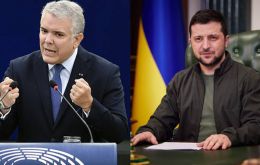
Colombian President Iván Duque Márquez Saturday held a telephone conversation with his Ukrainian colleague Volodimir Zelensky. Duque offered Colombia's assistance to the European leader, given the South American country's long history of handling refugee crises, it was reported.
-
Wednesday, March 30th 2022 - 09:46 UTC
Freedom of navigation part of new Arctic strategy, announces UK defense secretary

UK will maintain a Royal Navy presence periodically in the High North, as part of plans announced by Defense Secretary in Norway. The Defense Secretary has announced plans to ensure freedom of navigation and protect critical underwater infrastructure in the Arctic as part of a new strategy in the region.
-
Monday, March 28th 2022 - 09:38 UTC
British FM says Putin must withdraw from Ukraine for sanctions to be lifted

British Foreign Secretary Liz Truss hinted a possible exit route for Russia might be considered if President Vladimir Putin fully withdraws his troops from Ukraine and pledges “not to launch new aggressions.”
-
Friday, March 25th 2022 - 09:55 UTC
NATO to respond if Russia uses chemical weapons, Biden warns

US President Joseph Biden Thursday said that the North Atlantic Treaty Organization (NATO) would take direct action if Russia resorted to chemical weapons in Ukraine.
-
Tuesday, March 22nd 2022 - 09:55 UTC
Biden not going to Ukraine but Boris Johnson might
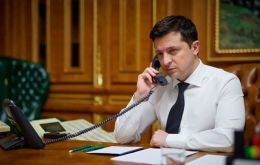
US President Joseph Biden will not be traveling to Ukraine during his trip to Europe this week to meet with NATO and EU allies. But British Prime Minister Boris Johnson has reportedly expressed his interest in a journey to Kyiv to bring a solid sign of support to Volodimir Zelensky.
-
Tuesday, March 8th 2022 - 09:10 UTC
Three UK Type 31 frigates for the Polish navy: a £1.4 billion deal
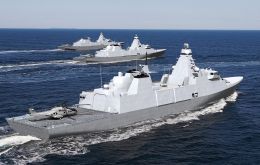
British defense giant, Babcock has struck a £1.4 billion deal to supply Poland's Navy with three frigates based on the Royal Navy’s Type 31 design. The warships will be built in Polish shipyards.
-
Monday, March 7th 2022 - 20:55 UTC
Bolivian top-secret dossier shows NATO's expansion into South America
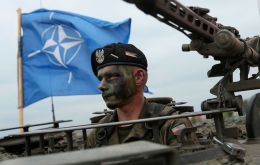
A newspaper report released Monday by Buenos Aires' daily Página 12 explained how the North Atlantic Treaty Organization (NATO) has expanded its influence over South America. The news outlet said the document which proved their story was “top secret.”
-
Friday, March 4th 2022 - 12:02 UTC
Ukrainian invasion triggers dramatic change in German post war policy
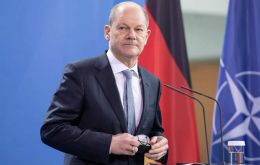
By Ed Turner, Reader in Politics, Co-Director, Aston Center for Europe, Aston University - If you’d asked experts just a fortnight ago what the key features of Germany’s approach to foreign and defense policy were, there would have been several strands. Alignment with the west, and of course membership of the EU and Nato would have been a feature.
-
Saturday, February 26th 2022 - 10:32 UTC
Mercosur can't agree on a joint communiqué on the Ukraine conflict
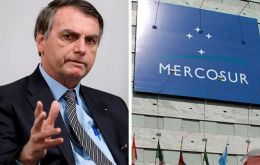
Lack of consensus on the drafting of a Mercosur joint statement on the Russia/Ukraine situation, plus the fact it was only signed by three of the four block's members, forced on Friday the removal of a first copy.
-
Saturday, February 26th 2022 - 09:40 UTC
Putin and Xi support Ukraine negotiations and demand respect for security concerns of all countries
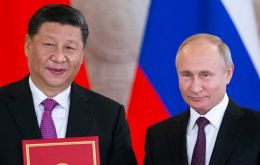
On Friday the leaders of Russia and China, Vladimir Putin and Xi Jinping spoke on the phone about the current situation in Ukraine. The two versions of official news agencies follow. The Russian version said the two leaders enhanced practical bilateral cooperation and closely coordinate actions in support of each other.
